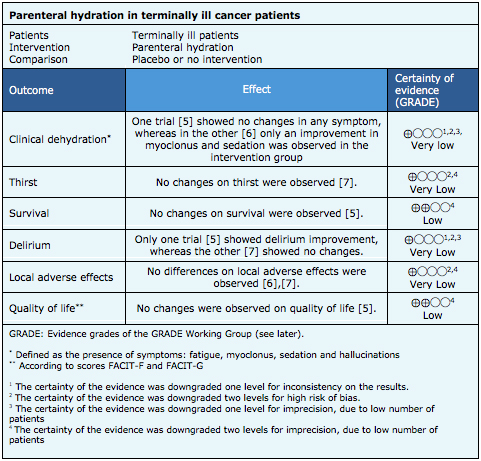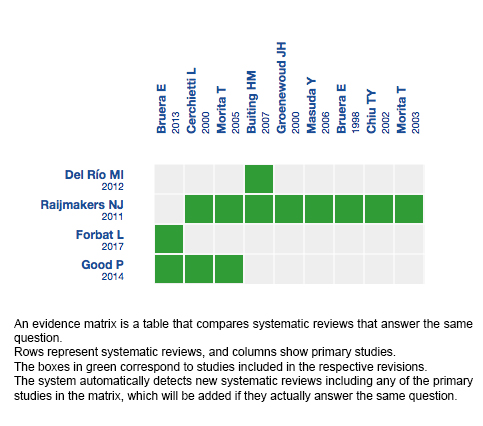Epistemonikos summaries
← vista completaPublished on February 12, 2018 | http://doi.org/10.5867/medwave.2018.01.7149
Is parenteral hydration beneficial in terminally ill cancer patients?
¿Es realmente beneficiosa la hidratación parenteral en pacientes con cáncer terminal?
Abstract
INTRODUCTION It is common for terminally ill patients to have a reduced fluid intake, which often results in a need for more medical support. However, it is not clear if this measure has a real clinical impact.
METHODS To answer this question we used Epistemonikos, the largest database of systematic reviews in health, which is maintained by screening multiple information sources, including MEDLINE, EMBASE, Cochrane, among others. We extracted data from the systematic reviews, reanalyzed data from primary studies and generated a summary of findings table using the GRADE approach.
RESULTS AND CONCLUSIONS We identified four systematic reviews including 51 studies overall, from which three were randomized trials. We concluded the administration of parenteral hydration might make little or no difference in terms of survival and quality of life in terminally ill cancer patients, and that it is not clear whether it has any other benefit because the certainty of the evidence is very low.
Problem
Reduced fluid intake in patients with end-stage cancer is a frequent event. It can be caused by different factors, such as complication of the disease (i.e obstruction due to neoplasia), or other symptoms like nausea or generalized weakness. Therefore, it is common for these patients to develop clinical signs of dehydration.
It is unknown whether parenteral hydration helps prolong life or reduce symptoms in these situation, or if it carries more risks than benefits such as local complications at the puncture site (e.g. erythema, edema, pain), or at systemic level (e.g. edema, congestive heart failure).
Methods
To answer the question, we used Epistemonikos, the largest database of systematic reviews in health, which is maintained by screening multiple information sources, including MEDLINE, EMBASE, Cochrane, among others, to identify systematic reviews and their included primary studies. We extracted data from the identified reviews and reanalyzed data from primary studies included in those reviews. With this information, we generated a structured summary denominated FRISBEE (Friendly Summary of Body of Evidence using Epistemonikos) using a pre-established format, which includes key messages, a summary of the body of evidence (presented as an evidence matrix in Epistemonikos), meta-analysis of the total of studies when it is possible, a summary of findings table following the GRADE approach and a table of other considerations for decision-making.
|
Key messages
|
About the body of evidence for this question
|
What is the evidence. |
We found four systematic reviews [1],[2],[3],[4] that included 51 |
|
What types of patients were included* |
All trials included patients with terminal cancer, clinical dehydration and reduced fluid intake. Two trials [5],[6] included patients older than 18 years and one trial [7] did not specify it. |
|
What types of interventions were included* |
Two trials [5],[6] evaluated parenteral hydration with saline (1 liter) SC versus placebo (defined as saline 100 cc SC). One trial [7] evaluated parenteral hydration with 5% dextrose + 140 mEq/L NaCl SC versus no intervention. |
|
What types of outcomes |
The trials measured multiple outcomes, but the identified systematic reviews grouped them as follows: clinical signs of dehydration, thirst, delirium, survival, quality of life and complications. |
* The information about primary studies is extracted from the systematic reviews identified, unless otherwise specified.
Summary of Findings
The information on the effects of parenteral hydration is based on three randomized trials [5],[6],[7] that included 230 patients.
Two trials [5],[6] reported the outcome clinical dehydration (defined as the following symptoms: fatigue, myoclonus, sedation, hallucinations) (180 patients). One trial [7] reported thirst (50 patients). Two trials [5],[7] (179 patients) evaluated incidence of delirium (according to Memorial Delirium Assessment Scale or MDAS), one trial [5] (129 patients) reported survival (at 17 days) and quality of life (FACIT-F and FACIT-G scores). Two trials [6],[7] (101 patients) measured local adverse effects of the puncture site (pain, edema).
The summary of findings is the following:
- It is not clear if parenteral hydration improves clinical dehydration in terminally ill cancer patients because the certainty of the evidence is very low.
- It is not clear if parenteral hydration improves thirst in terminally ill cancer patients because the certainty of the evidence is very low.
- Parenteral hydration might have little or no effect on survival of terminally ill cancer patients, but the certainty of the evidence is low.
- It is not clear if parenteral hydration prevents delirium in terminally ill cancer patients because the certainty of the evidence is very low
- It is not clear if parenteral hydration leads to greater local adverse effects in terminally ill cancer patients because the certainty of the evidence is very low
- Parenteral hydration may make little or no difference in the quality of life of terminally ill cancer patients, but the certainty of the evidence is low.


Other considerations for decision-making
|
To whom this evidence does and does not apply |
|
| About the outcomes included in this summary |
|
| Balance between benefits and risks, and certainty of the evidence |
|
| Resource considerations |
|
| What would patients and their doctors think about this intervention |
|
|
Differences between this summary and other sources |
|
| Could this evidence change in the future? |
|
How we conducted this summary
Using automated and collaborative means, we compiled all the relevant evidence for the question of interest and we present it as a matrix of evidence.

Follow the link to access the interactive version: Parenteral hydration in terminally ill patients
Notes
The upper portion of the matrix of evidence will display a warning of “new evidence” if new systematic reviews are published after the publication of this summary. Even though the project considers the periodical update of these summaries, users are invited to comment in Medwave or to contact the authors through email if they find new evidence and the summary should be updated earlier.
After creating an account in Epistemonikos, users will be able to save the matrixes and to receive automated notifications any time new evidence potentially relevant for the question appears.
This article is part of the Epistemonikos Evidence Synthesis project. It is elaborated with a pre-established methodology, following rigorous methodological standards and internal peer review process. Each of these articles corresponds to a summary, denominated FRISBEE (Friendly Summary of Body of Evidence using Epistemonikos), whose main objective is to synthesize the body of evidence for a specific question, with a friendly format to clinical professionals. Its main resources are based on the evidence matrix of Epistemonikos and analysis of results using GRADE methodology. Further details of the methods for developing this FRISBEE are described here (http://dx.doi.org/10.5867/medwave.2014.06.5997)
Epistemonikos foundation is a non-for-profit organization aiming to bring information closer to health decision-makers with technology. Its main development is Epistemonikos database (www.epistemonikos.org).
Potential conflicts of interest
The authors do not have relevant interests to declare.

